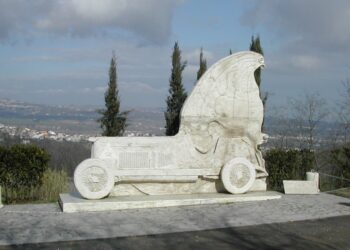The Saudi Arabian was up captivated by autos and sees herself as a true “petrolhead.” But after watching her first 24 Hours of Le Mans during college, when she witnessed an amateur driver standing on the podium, Juffali understood, “Even though I didn’t understand how the race works, that was enough for me to realize, ‘Oh, okay, this is something that I can do if I like.'” A year or two later, at approximately the age of 19, she booked her first track day in the United Kingdom and drove her sister’s Mini Cooper. Juffali pushed the automobile to its limits, confirming that she could pursue racing if she wanted to. “It was just instantaneous, like, the feeling of, ‘This is where I belong.'”
But getting her foot in the door proved more challenging. Becoming Saudi Arabia’s first female race driver and establishing her own squad was “a long and slow process.” Now, as F1 Academy’s first wild card entrant of the season, Juffali may highlight her nation and use the platform to achieve a different aim than most people think, given that the series is part of the F1 pyramid.

She grew up in Jeddah, Saudi Arabia, and was fascinated by vehicles at “a very basic level,” she added. Juffali had never contemplated a career in racing until moving to the United States to study international affairs at Northeastern University in Boston, Massachusetts. College exposed her to a variety of activities, including racing. “It was like a ‘aha moment’ where I realized, oh, this combines two of my hobbies together. I don’t have to be simply a car enthusiast and keep to that. “There is a sport behind it.” Juffali stayed focused on her schoolwork, but racing lingered in the background. Her life changed when she saw an amateur racer reach the podium at Le Mans in the early 2010s.
The track day in her sister’s Mini Cooper was the next stage in her path, but she still had doubts about how to begin her motorsports career. She graduated in 2014 and began investigating ways to obtain her racing license while residing in the United States. “It was more complicated than I expected,” Juffali explained. She kept working. Juffali remained interested in politics, entrepreneurship, and economics, doing a few internships in the United States and the United Kingdom. Juffali ultimately got a job in the banking field, but she continued returning to the track. Juffali discovered that getting her racing license in the United Kingdom “was a much easier process” because to the folks she met there. She called the Saudi Federation to see whether she could apply in the UK and what the procedure would be. She was given the green light and sought her racing license in the United Kingdom.

However, her voyage stalled. While her non-racing career progressed as she went from position to position, there was little change on the racing side. An opportunity in her non-racing life presented itself, and she returned to Saudi Arabia in 2017, “working more on a freelance basis.” That same year, Saudi Crown Prince and Prime Minister Salman bin Abdulaziz Al Saud suddenly announced that the country’s prohibition on women driving will be lifted, with the change taking effect the following summer. Juffali sensed employment uncertainty and decided to grasp the opportunity, telling herself, “Okay, I’ll take these three months off to get my racing license and learn how to race, and then I’ll just be a casual racer on weekends.” In retrospect, she views this period in her life as “one road finishing, trying to find my feet somewhere else.”.
Juffali participated in the GT World Challenge Europe at Monza in 2023.
Susie Wolff was interested in Saudi Arabia in 2017, and the two ladies met through a common acquaintance.
Juffali did not go into depth about their talk with The Athletic. She did note that, in the end, she asked Wolff for suggestions on how to pursue racing, such as who she should contact and where to go. Wolff referred Juffali to Winfield Racing School in the south of France, claiming they might help her. Juffali, who was about 25, took Wolff’s suggestion. Six months later, Juffali emailed her and included a photo demonstrating that she had taken the initiative and listened.

Wolff was the one who contacted Juffali about the opportunity to compete during her hometown’s racing weekend, and she quickly accepted the offer. She thought about it before phoning back, eventually calling the decision a “no-brainer.”
Juffali will start from P14 in Race 1 this weekend, feeling “privileged” and excited to race at home. The symbolism of this moment, as well as the underlying lesson of her life as she soared to these heights despite all difficulties, underline the same message: “Can see, can be.”
“I want people to understand that this is something that is achievable. It is attainable.”











